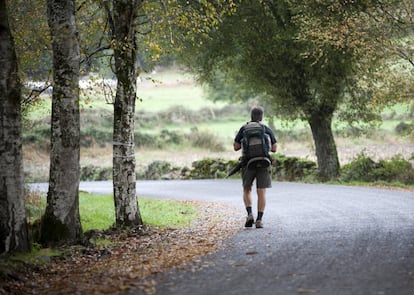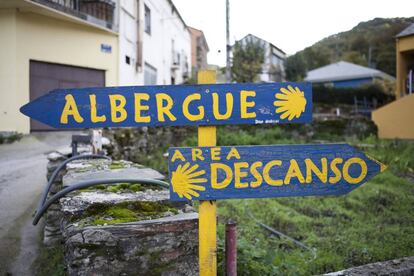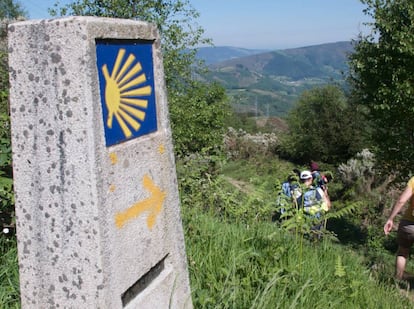Down the wrong path: Spanish city fights against fake signs on Camino de Santiago
Associations say some bar owners are altering official markings to get people to walk by their establishments, even if it means a risky detour

The northern Spanish city of Ponferrada (León) is struggling to deal with a deceptive practice that affects other municipalities along the famous Camino de Santiago (Way of Saint James) pilgrimage route, which thousands of people undertake each year.
The ruse involves leading pilgrims down the wrong route, often to get them to stop at food and drink establishments that are located off the real road to Santiago de Compostela, in the northwestern region of Galicia.
We need the authorities to impose economic sanctions that currently do not even exist
Roger De La Cruz, association president
“The problem is the bad image that the pilgrims get of the Camino itself and of the city,” explains Roger De La Cruz, president of the Association of Friends of the Camino de Santiago of El Bierzo, the latter being a historical demarcation that encompasses Ponferrada and nearby municipalities.
“Our dark spot is a fork in the road outside Ponferrada, as you arrive from Molinaseca, which the French Way runs through,” says De La Cruz. The French Way is the most popular of all the routes to Santiago, where the remains of the apostle Saint James are said to be buried. It is also a designated UNESCO World Heritage Site.

At this fork in the road, the milestone indicating the way to Santiago is blurred, and it has been replaced with yellow arrows painted on the pavement. These arrows deliberately mislead pilgrims down the wrong way, notes the association president.
If the travelers pick the left road (the official one), they will arrive at Santiago without making any detours or exposing themselves to risky situations. But if they choose the right road, they could find themselves in the middle of nowhere, or even in the wrong direction altogether, headed back for Astorga.
“The Camino should be a safe environment. We cannot tolerate a few individuals manipulating it with a can of yellow spray paint,” says De La Cruz.
In the summer of 2016, members of the Civil Protection services and students from the Spanish School of Languages made a coordinated effort to prevent pilgrims from going off-route. But they cannot stop scores of unofficial markings from showing up along the route every so often. “The signage along the Camino is sacred and must not be altered for commercial or personal purposes,” said a source at the El Bierzo association.
According to Ponferrada tourism authorities quoted by a regional media outlet, the individuals behind these acts are “people who live in the area.” Many local associations agree. “In places like O Porriño, in Pontevedra, there have been reports of owners of bars located near the route who were altering the signs on purpose,” says De la Cruz. This detour forced the pilgrims to cross an industrial park filled with heavy vehicles, where there are several eating establishments on each side of the road.

This practice has become so common that several groups have come together in the Association of Municipalities of the Camino de Santiago to try to fight it together. Created in 2015, it includes larger cities such as Logroño, Burgos and Jaca. “It was crucial as a way to bring everyone’s complaints together and get the regional government of Castilla y León to listen to us,” says De La Cruz.
For now, there is a proposal to gradually standardize the official symbols showing the correct directions along the French Way. The region of Castilla y León will be the first to benefit, starting next year.

“It will help pilgrims get a better understanding of their whereabouts. It’s a great step forward,” says De La Cruz, who nevertheless describes it as insufficient. “We need the authorities to impose economic sanctions that currently do not even exist.”
Fresh in everyone’s mind is the case of Denise Pikka Thiem, an American woman who was murdered in León province in 2015 as she walked the Camino by herself. The killer had put up fake signs to lure pilgrims near his property.
English version by Susana Urra.
Tu suscripción se está usando en otro dispositivo
¿Quieres añadir otro usuario a tu suscripción?
Si continúas leyendo en este dispositivo, no se podrá leer en el otro.
FlechaTu suscripción se está usando en otro dispositivo y solo puedes acceder a EL PAÍS desde un dispositivo a la vez.
Si quieres compartir tu cuenta, cambia tu suscripción a la modalidad Premium, así podrás añadir otro usuario. Cada uno accederá con su propia cuenta de email, lo que os permitirá personalizar vuestra experiencia en EL PAÍS.
¿Tienes una suscripción de empresa? Accede aquí para contratar más cuentas.
En el caso de no saber quién está usando tu cuenta, te recomendamos cambiar tu contraseña aquí.
Si decides continuar compartiendo tu cuenta, este mensaje se mostrará en tu dispositivo y en el de la otra persona que está usando tu cuenta de forma indefinida, afectando a tu experiencia de lectura. Puedes consultar aquí los términos y condiciones de la suscripción digital.









































